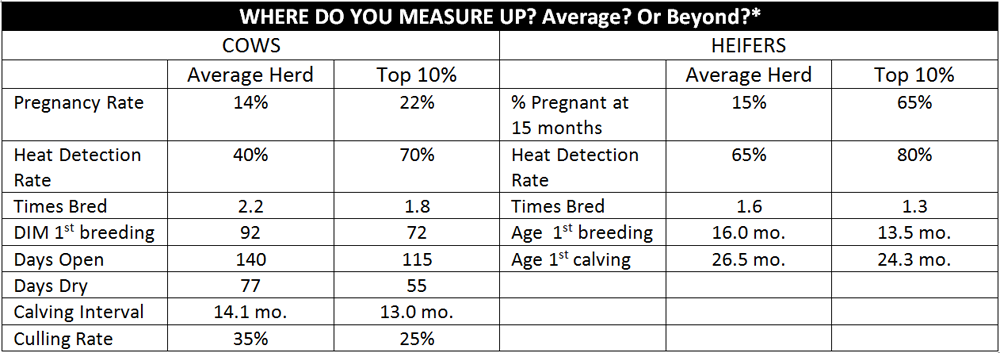When you’re looking for money on your dairy farm, pregnant is where it’s at! The person, team or tools responsible for success in this area, rank up there with the best investments you will ever make. What is it worth? A lot! The Bullvine did some CSI investigation – Cow Scene Investigation into the numbers.
Face the Facts. Who’s to Blame?
According to researchers at the University of Wisconsin, 96 percent of the variation in conception rate comes from management factors. Only the last 4 percent is related to the individual cow and service bull’s genetics.
Less is More $$$
Even though we are looking for more there are four lesser values that will help us make those dollars: fewer non-productive cow and heifer days; fewer breedings and therefore less semen used; fewer vet expenses and, last but not least, less labor for observing, caring and feeding.
These four will make you big money. And, one more, in fifth place that may be hard to get your head around. You may have to be willing to sacrifice 2 to 5 pounds of milk per day for the sake of reproduction. It appears to be on the negative side of the ledger because of the immediate reduction in the milk check. However, the other savings could far outweigh this apparent deficit. Don’t forget more calves are born and there is less culling of non-pregnant cows and heifers.
If you require more incentive, one anecdotal story reports on a herd that has a 25% pregnancy rate and the breeder projects that “over the next seven years I can double the size of my herd through internal growth alone.”
Where Has All Your Money Gone?
$- A missed heat cycle can cost as much as $29
$$- A missed pregnancy costs an average of $450
$$$ – Further economic analysis shows that each percentage point increase in pregnancy rate is equal to a saving of $35 per cow per year. So going from the average pregnancy rate of 14% to the top of 22% there is a savings of $280. It is entirely possible that considering all factors and both cows and heifers that a farm of 250 cows could save $75,000 which is $300 per cow per year.
At these levels of return, it’s easy to see how improving your reproductive performance pays off. If you save $75,000 or even $50,000 (2/3 savings), you could hire an employee dedicated only to reproduction protocols and improvements.
When DIM is delayed because cows do not become pregnant on time, it’s not unusual to see a reduction of 10 pounds of milk of more per cow per day. This too adds up quickly. This milk is not down the drain. It never even made it to the bucket!
Take Advantage of Your Team
There are many experts who can bring something to your team: A.I. staff, veterinarians, nutritionists, extension workers and other breeders. With these consultants don’t shy away from mistakes. Once you know and admit where the problem is, you are half way to solving it. Once the problems are identified you have the opportunity to put solutions in place and make more money.
Invest in Cow Catchers
Heat detection is the easiest of the parameters to influence with training and management attention. The lower your current reproduction record is, the larger opportunity you have to improve it. One hour per week invested in training (i.e. heat detections) at $10 an hour will recover a tenfold or higher return from improved reproductive performance over a year. Make sure the eyes on your cows know how to find cows in estrus. Upgrade staff skill sets for managing reproduction and breeding for a pregnancy. Take a course or have staff take a refresher in insemination techniques. Spend a little to save or make a lot.
Genetics is Where Every Little Bit Counts!
Although genetics only accounts for 5 to 10% of reproductive performance there are opportunities to improve here as well.
- Use higher conception semen
- Use semen with more sperm per dose
- If available, use semen that has a longer viability after insemination
- Only use sires that have 107+ Daughter Fertility or DPR 1.2+
- Avoid bulls that are over 2.85 SCS, cows more susceptible to mastitis do not conceive easily.
Step Up Your Game. Get off to a Good Start
- Increase observations and monitoring (at least 3x per 24 hours)
- Increase observations of bred animals until they are confirmed pregnant
- Maintain accurate and complete records for access by all staff
- Pregnancy check between 28 and 35 days post breeding
- Cull any female that requires a 4th service
Take Advantage of Cash Cow Tools
- Use a synchronization program for cows or heifers for which a heat is not seen
- Use the reproduction part of your herd management software. Examples: REPRO MONEY is free of charge to Wisconsin dairy producers and is expanding to additional states in the future. Other states, milk recording agencies and universities have similar programs.
- Use activity monitors for loose housed animals
- Investigate using transition cow and rumination software programs.
THE BULLVINE BOTTOM LINE:
You can’t reverse financial challenges such as high feed prices and items beyond your control. However improving poor reproduction is your responsibility. Getting it right will significantly drive your profitability at the best of times and see you through the challenging ones!
Get original “Bullvine” content sent straight to your email inbox for free.













